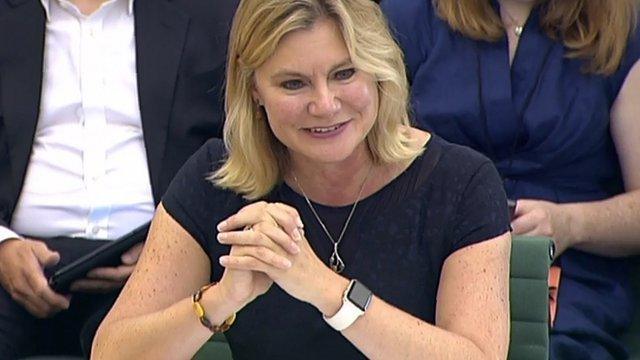Untalented rich still earn more, says Greening
- Published
- comments

Low-ability youngsters from wealthy families go on to earn more money than their more gifted, poorer counterparts, says the Education Secretary Justine Greening.
Fairer outcomes remained an "entrenched" problem, she said, at an event promoting social mobility.
Too many pupils fail to reach their potential, said Ms Greening.
Making the most of all young people's talent was a "hard, cold, economic imperative," she said.
"Children from high-income backgrounds who show signs of low academic ability at age five, are 35% more likely to become high earners than their poorer peers who show early signs of high ability," Ms Greening told a Social Mobility Commission event.
Ms Greening said giving a fairer opportunity to all pupils remained a "really hard long slog".
In her own family, she said she was the first to go to university.
And the education secretary said that she had never planned to be a politician - and could remember her father shouting at out-of-touch politicians on the television.
He was "frustrated that he felt they didn't really talk about his life," she said.

Justine Greening said social mobility should be an economic priority
Ms Greening said that poorer pupils, despite any early signs of talent, were more likely to leave school without A-levels and miss out on the chance to go to university.
Even among those who went to university, there were still inequalities.
"Graduates from disadvantaged backgrounds who do make it to the top jobs still earn, on average, over £2,200 a year less than their colleagues who happen to have been born to professional or managerial parents," she said.
This was not just economic disadvantage, but also geographic, with some parts of England having much lower attainment, she said.
A child living in one of the country's most disadvantaged areas was 27 times more likely to go to an inadequate school than a child in the most advantaged area, said Ms Greening.
She said the government's "opportunity areas" would help to focus support in such deprived areas.
And ensuring a supply of quality teachers could make a big difference to accelerating attainment.

Tim Nice But Dim - a stereotype invented by comedian Harry Enfield - is still doing well, says the education secretary
With the end of European Union membership, she said, it would become an economic necessity to make better use of all young people's abilities.
Rather than employers "scouring the world" to find staff, she said, employers would need to focus more on making better use of home-grown talent.
The UK had lower levels of productivity than many competitors, much of which was down to low levels of education, and that showed the importance of investing in education and training.
Grammar schools
But this week the education secretary faced strong criticism from the Public Accounts Committee, who warned the Department for Education had failed to engage with the seriousness of funding problems facing schools.
MPs said ministers were failing to recognise the "real-world consequences" of their funding plans.
The government has said that creating new grammar schools will promote social mobility.
But Ms Greening said that any new grammars would also be accompanied by a "new model" for selection.
"We're talking about a new model of grammar schools and how selection can work," she said.
"It means an education system which caters for the very different talents and potential of different children - whether it's technical education, maths schools or whether it's giving local communities a choice over how selection works at local level.
"If we're really going to have things different - we have to be prepared to look at what that will take.
"Do we want to make sure though that new grammars will work effectively, collaboratively to lift attainment overall? Absolutely - that's precisely why there's so much work going on right now to make sure what we bring forward will be a new model of selection that works constructively to raise attainment."